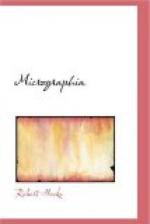of those, commonly reckon’d, of the first, second,
third, fourth, fifth, and sixth Magnitude; so that
should they be distinguish’d thereby, those
six Magnitudes would, at least, afford no less then
thrice that number of Magnitudes, plainly enough distinguishable
by their Magnitude, and brightness; so that a good
twelve foot Glass would afford us no less then twenty
five several Magnitudes. Nor are these all, but
a longer Glass does yet further, both more nicely distinguish
the Magnitudes of those already noted, and also discover
several other of smaller Magnitudes, not discernable
by the twelve foot Glass: Thus have I been able,
with a good thirty six foot Glass, to discover many
more Stars in the
Pleiades then are here delineated,
and those of three or four distinct Magnitudes less
then any of those spots of the fourteenth Magnitude.
And by the twinkling of divers other places of this
Asterisme, when the Sky was very clear, I am
apt to think, that with longer Glasses, or such as
would bear a bigger
aperture, there might be
discovered multitudes of other small Stars, yet inconspicuous.
And indeed, for the discovery of small Stars, the
bigger the
aperture be, the better adapted
is the Glass; for though perhaps it does make the several
specks more radiant, and glaring, yet by that means,
uniting more Rays very near to one point, it does
make many of those radiant points conspicuous, which,
by putting on a less
aperture, may be found
to vanish; and therefore, both for the discovery of
the fixt Star, and for finding the
Satellites
of
Jupiter, before it be out of the day, or
twilight, I alwayes leave the Object-glass as clear
without any
aperture as I can, and have thereby
been able to discover the
Satellites a long
while before; I was able to discern them, when the
smaller
apertures were put on; and at other
times, to see multitudes of other smaller Stars, which
a smaller
aperture makes to disappear.
In that notable Asterism also of the Sword
of Orion, where the ingenious Monsieur Hugens
van Zulichem has discovered only three little
Stars in a cluster, I have with a thirty six foot Glass,
without any aperture (the breadth of the Glass
being about some three inches and a half) discover’d
five, and the twinkling of divers others up and down
in divers parts of that small milky Cloud.
So that ’tis not unlikely, but that the meliorating
of Telescopes will afford as great a variety
of new Discoveries in the Heavens, as better Microscopes
would among small terrestrial Bodies, and both would
give us infinite cause, more and more to admire the
omnipotence of the Creator.
* * * *
*
Observ. LX. Of the Moon_._




